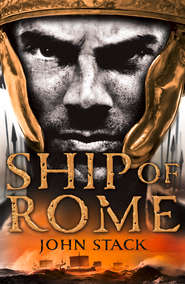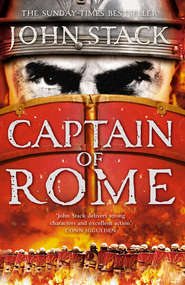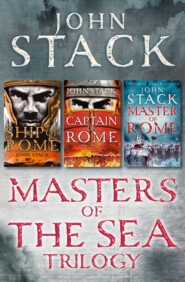По всем вопросам обращайтесь на: info@litportal.ru
(©) 2003-2024.
✖
Master of Rome
Настройки чтения
Размер шрифта
Высота строк
Поля
‘They’re too outnumbered,’ Gaius remarked, glancing to the approaching Roman fleet.
Atticus nodded again and set his mind to the task. He moved to the side rail to get a better view of the sea ahead. ‘Gaius, what’s north of here?’ he asked.
‘The coastline runs north for ten leagues to a cape and then turns southwest for forty leagues into the bay of Carthage.’
They’ll never get as far as Carthage, Atticus thought, but, as he looked to the approaching Roman fleet, waiting for them to change course to intercept the Carthaginian formation, a sliver of doubt remained in his mind. Barca had been beaten before, but never due to error, and Carthaginian seamanship still outmatched that of most Roman crews. If the enemy were staying in formation, then their true motive was yet to be revealed.
‘They’re running,’ Nobilior shouted in elation.
Paullus turned to the junior consul and frowned, regarding the excessive display of emotion as undignified, although he too felt the satisfaction of seeing the enemy flee in the face of his command.
‘Helmsman, change course to intercept,’ Paullus ordered, and the Concordia turned two points to starboard, the fleet behind responding immediately.
The enemy fleet was still some five miles away, sailing parallel to the coastline, their galleys bunched together as if racing each other in a bid to escape. Paullus followed the line of their course, immediately seeing the land give way to the north as it turned a headland.
‘Helmsman,’ he said, ‘increase speed. I want to reach that headland before the enemy has a chance of rounding it.’
The helmsman nodded, calling for battle speed, and Paullus nodded in satisfaction as he felt the pace of the Concordia increase. He looked to the main deck and the ordered ranks of the legionaries, sensing their expectation, allowing it to feed his own impatience, and he sneered in contempt as he thought of the enemy’s futile attempt to escape his wrath.
‘The Romans are turning to pursue,’ the lookout called, and Hamilcar glanced over his starboard aft-quarter to confirm the course change of the enemy fleet before turning to look out over the aft-rail. The Roman galleys from Aspis were just breaching the harbour mouth, now more than two miles behind the last ship in his formation, and Hamilcar watched as they neatly formed behind the lead galley, beginning their pursuit in earnest.
Hamilcar turned to the sea ahead and the coastline to his left, silently naming the landmarks in sequence as the Alissar sped north, his intimate knowledge of the shoreline deepening his resolve to deny the Romans any part of his people’s sacred land. To his right the Roman fleet was slowly closing the gap as they sailed diagonally towards him, revealing their simple plan to cut his course as he made to round Cape Hermaeum. Hamilcar thanked Tanit for the Romans’ actions, forgetting her earlier duplicity.
His fleet was outnumbered, but Hamilcar knew he stood a reasonable chance of thwarting the Romans’ attempt to trap him if he could level the odds or – better yet – turn them in his favour. Victory might yet be possible or, failing that, retreat with honour. Either way, Hamilcar needed to keep his fleet together, and Cape Hermaeum would give him that chance.
Atticus stayed at the side rail of the aft-deck as the Orcus settled on a northerly track, the galleys of his command slipping into the wake of the Carthaginian formation, using the enemy’s course to avoid any hidden shallows along the coastline. He was joined there by Septimus, while the legionaries formed up behind Drusus on the main deck, the proximity of the enemy dictating every action on the quinquereme.
‘The main fleet will reach the enemy first,’ Atticus said, thinking aloud, judging the angles and speed of their attack.
‘Pity,’ Septimus replied, his hand kneading the hilt of his sword, the anger he felt at the loss of the Ninth increasing with every oar stroke, the fact that Hamilcar Barca was in command of the enemy fleet giving his aggression a keen edge.
Atticus looked to his friend and nodded, understanding his fury, his own battle lust rising within him. The Ninth was Septimus’s former legion, but Atticus had formed his own bond with the legionaries over the previous years, understanding and accepting the symbiotic relationship between the two forces. He had put his ship and his crew in harm’s way many times to protect the soldiers of Rome.
The Orcus sped on, her ram slicing cleanly through the calm water, the gentle swell separating cleanly across her cutwater to run down the length of her hull, her wake instantly sliced by the ships behind. The galley’s crew settled into silence, the drum beat dominating; the trailing wind tugged at the furled sail, the creak of running rigging and the rhythmic splash of the oars replaced the shouted commands. The pursuit demanded nothing more of the crew than patience as each man waited for the battle to come.
Atticus rubbed his fingers on the side rail, his eyes constantly darting to the four points of his galley, checking and rechecking her trim, the unconscious routine of a man who had spent his life at sea. Septimus stood immobile beside him, his hand resting on the hilt of his sword, his eyes focused two miles ahead on the enemy galleys, watching with the endless patience of a career soldier.
‘You’ll target Barca’s galley?’ Septimus asked, glancing at Atticus, whose gaze was locked on the two convergent fleets.
‘Don’t worry, Septimus,’ he replied, never taking his eyes off the waters ahead. ‘We’ll get him.’
The centurion nodded and looked to his men on the main deck. Once the battle was joined he would have no control over the course of the Orcus, depending entirely on Atticus to get him and his legionaries into the fight, the prefect deciding which galleys to target in the rush of battle. As a soldier, such reliance was second nature, but, as a commander in his own right, Septimus had developed a deep respect for Atticus’s ability. When the fleets engaged, the battle would swiftly descend into a mêlée, and a centurion leading his men over a boarding ramp on to an enemy ship needed to know his line of retreat was secure. Over the years he had fought alongside Atticus, Septimus had never once looked over his shoulder.
‘Barca is doing a bad job of trying to escape,’ he remarked, looking to the headland beyond the Carthaginian galleys.
‘I’m not convinced he is trying to escape,’ Atticus said, giving voice to the doubt that refused to subside.
‘The Carthaginians are no cowards,’ Septimus replied sceptically, ‘but they’re no fools either. The odds against them are too high.’
‘Then why haven’t they increased speed or taken advantage of this tailwind and raised sail?’ Atticus said. ‘Only ships going into battle would keep their mainsails furled.’
Septimus shook his head, unable to answer. ‘Either way,’ he said, putting his helmet on for the first time, ‘it looks like we’re in for a fight.’
Atticus nodded and slapped his friend on the shoulder, knowing the centurion was eager to confront the enemy. Septimus turned and left the aft-deck, taking up his position at the front of his men on the main deck. Drusus saluted smartly before falling into the ranks; the optio, like all of Septimus’s men, was ready for battle.
‘Nabeul,’ Hamilcar said to himself as the Alissar sped past the tiny fishing village, ‘over halfway there.’
He looked to the Roman fleet, now two miles off his starboard beam, their course still convergent with his own, both fleets aiming for the headland ahead. We’re moving too fast, Hamilcar thought, estimating that his own ships would reach the headland before the Romans and he immediately ordered the helmsman to drop to standard speed, the galleys behind the Alissar bunching up slightly as the pace dipped, before the crews brought their ships back into perfect formation.
Hamilcar relayed his orders to the squad commander at the rear of the fleet, keeping the command simple to avoid confusion or an error in signalling. The battle ahead was unavoidably going to be fought on two fronts, with the Carthaginians out numbered on both. Only a quick result would achieve victory, a prolonged fight could only end in defeat.
Hamilcar’s gaze fell across the deck of the Alissar, his men formed into loose ranks, many with their swords drawn as they prepared for battle. He spotted signs of nervousness amongst them – men moving restlessly; others with their gaze locked on the deck – and Hamilcar felt his anger rise anew. Before Ecnomus these same men would have stood resolute before battle, always with their eyes turned to the enemy, willing them on, eager for the fight. Now they were riddled with doubt and Hamilcar realized that his crews might easily panic should the tide of battle turn against them.
He looked to the sea ahead once more, the shoreline filling his vision on the left, the Roman fleet on the periphery on his right, and the headland dead ahead. For Hamilcar, his only hope was to get the larger Roman fleet to disengage and flee. He focused on the waters just beyond the headland, looking to the ally that could give him victory.
We have them, Paullus thought, slamming his fist on to the side rail in triumph. His galleys would reach the headland before the Carthaginians. He looked to the galleys flanking the Concordia, the earlier formation now ragged as ships competed to be first into battle, although none dared to overtake the flagship. The senior consul felt renewed pride in the overt display of confidence and aggression and he called for more speed, spurring his fleet to a greater pace, the thrill of battle surging through him.
The helmsman made minor adjustments to the Concordia’s course, steering the quinquereme to reach just beyond the headland to give the fleet room to turn into the fight and face the Carthaginians head on, allowing them to bring their deadly corvi to bear, the legionaries on every galley already moving forward to form up behind the boarding ramps, many of the soldiers whispering prayers to Mars, the god of war, to give them strength in the battle ahead. Paullus stood firm on the aft-deck, the junior consul beside him, a display of calm authority and steadfast courage in the face of battle. The headland was but a mile away and the enemy was now hopelessly trapped.
Something’s wrong, Atticus thought, his intuition sensing the change before he could confirm it, his eyes turning to the gap between the Orcus and the Carthaginian formation ahead.
‘Gaius,’ he called, turning to the helmsman.
‘I see it,’ he replied, his own gaze locked on the sea ahead. ‘We’re gaining on them.’
The Carthaginians are slowing down, Atticus thought, his instincts screaming alarm, his eyes darting everywhere as he tried to determine the cause. He moved to the tiller, his mind registering the steady drum beat from below decks, the steady pace of battle speed unchanged.
‘Baro, confirm our speed,’ Atticus ordered, and the second-in-command acknowledged the command, calling for a marker to be made ready on the foredeck. He ran to the aft and signalled for the marker to be dropped, counting the seconds until it passed his position. He paused for a moment as he calculated.
‘A shade over eight knots, Prefect,’ Baro said. Battle speed.
‘Something in the water ahead maybe, some hindrance?’ Gaius suggested.
Atticus shook his head. The water was calm, the only disturbance caused by the wakes of the Carthaginian galleys.
‘Barca wants our ships to reach the headland first,’ Atticus said, speaking aloud the only conclusion he could draw.
‘And our galleys will do exactly that,’ Gaius replied, feeling the same sense of alarm as his commander.
‘Baro,’ Atticus said. ‘We need to try and signal—’
‘Aspect change in the Carthaginian formation,’ Corin shouted from the masthead, and all eyes turned immediately to the fore. ‘The rear-guard is turning to engage.’
A squad of twenty-five galleys turned neatly from the rear of the enemy force and away from the coastline, moving swiftly into open water. They were increasing speed, coming about at a terrifying pace, the galleys transformed within seconds from escaping prey to ferocious attackers. Precious seconds passed as Atticus watched the enemy rear-guard deploy.
‘Your orders, Prefect,’ Baro said, an edge to his voice as he waited for the command to deploy the squadron into line of battle to counter the threat.
Atticus ignored the demand, but looked instead to the main Carthaginian formation, their course unchanged, the vanguard of the Roman fleet now obscured by the enemy ships as they swept in before the Carthaginians’ course.









